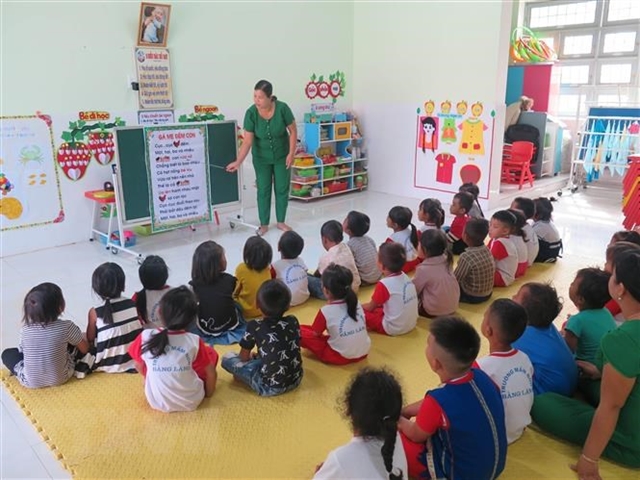 Society
Society

 |
| Children are taught the Vietnamese language at Bằng Lăng Kindergarten in the Central Highland province of Kon Tum. VNA/VNS Photo Dư Toán |
HÀ NỘI — Deputy Prime Minister Vũ Đức Đam, on behalf of the Government, has approved a plan to improve preschool education in disadvantaged areas over the next eight years.
As part of the initiative, all makeshift classrooms will be replaced, and educational equipment will be upgraded to provide students with the best possible learning environment.
Under Decision No.1609/QĐ-TTg, the project aims to ensure the quality of teachers, schools and classroom facilities to increase children's opportunities to access formal preschool education, ensure equity in access to education, and contribute to shortening the development gap between regions.
It also contributes to implementing hunger eradication and poverty reduction, enhancing economic and social development, and preserving and promoting cultural values for areas where many ethnic minorities live from 2022 to 2030.
Children, administrators, teachers, and preschool staff in disadvantaged areas, especially those in challenging locations, such as along the coast and islands, mountainous or isolated areas.
The project targets that at least 25 per cent of children of kindergarten age and 95 per cent of children of preschool age in disadvantaged areas will have access to preschools by 2030.
Sixty per cent of ethnic minority children in preschools will be taught the Vietnamese language. In addition, at least 80 per cent of localities with many ethnic minorities will have models of teaching the Vietnamese language to ethnic children.
Children will be provided with learning materials to strengthen the Vietnamese language based on the children's mother tongue.
Every year, 100 per cent of children in disadvantaged areas will be nurtured, cared for and educated according to a preschool educational curriculum suitable to each region.
The project also targets 60 per cent of teachers to know their children's mother tongue by 2030 to ensure teaching quality.
It aims to replace makeshift classrooms with new standard facilities by 2030. In addition, new classrooms will be equipped with outdoor and indoor playsets and school supplies.
The project will focus on completing mechanisms and policies for developing preschool education in disadvantaged areas to achieve these goals. In addition, supportive policies for kindergarten children will be considered, including free lunch, tuition fee exemption and reduction, and support for study expenses.
It will strive to ensure the quota of teachers per class in disadvantaged areas, with priority given to teachers at school sites in mountainous, coastal and border areas, supplement policies for teachers in underprivileged areas, especially those who directly teach ethnic minority children, and fully and promptly implement mechanisms to attract teachers to work long-term in disadvantaged areas.
Teachers and administrators of preschools in disadvantaged areas will be trained to improve their professional and ethnic language skills.
Under the project, roadmaps to build public houses for teachers will be set up.
Mechanisms will be developed to mobilise resources for developing preschool education in disadvantaged areas. — VNS



.jpg)
